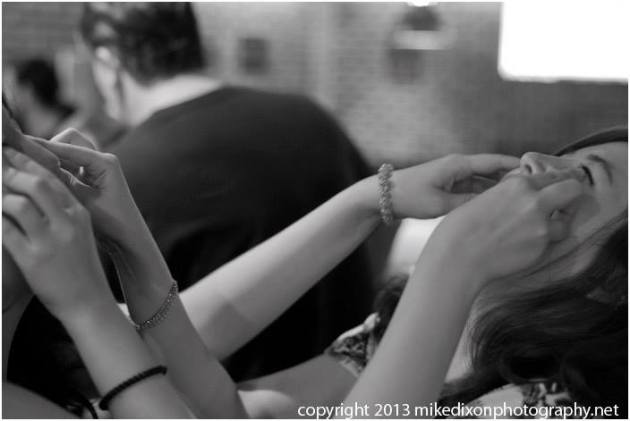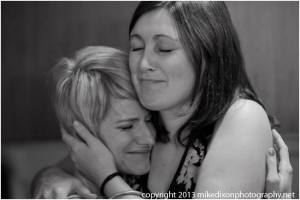
I was thinking recently about the old saying that you can choose your friends and but you can’t choose your family and how this commonsense idea warps when you’re an expat. Living abroad, I find I often haven’t chosen my friends in the same way I did before, sometimes to the point of having little choice in the matter. This was particularly true when I lived in a smaller city fifteen years ago, at a time when there just weren’t many foreigners around. There were people I befriended then who I still count as friends and keep in touch with, while some others I almost certainly would not have become friends with had the potential friend pool been even ankle deep.
Some of them were people I might even have avoided had we met in our homelands. I think of P. who studied traditional Korean swordsmanship for the express purpose of going back to Canada and telling people that he had studied swordsmanship in Asia – “how fucking cool is that” – even laying out a thousand bucks for a sword that would no doubt do nothing but hang in a prominent spot on his living room wall. I think of T. who never shut up, shouted almost everything he said, and whose idea of jamming was to have you play a repetitive chord pattern while he soloed nonstop. Both of them were guys I hung out with frequently on Friday and Saturday nights, had laughs with, shared some good times with, and when time came to part ways, said goodbye to forever. There were others who I would have steered clear of had we been in New York, but in Korea, the only foreigners I really avoided were the ones with the profound defects: the dysfunctional alcoholics, the fighters, the criminals, the wackjobs. Everybody else was okay.
When you’re one of a handful of foreigner residents in a small town there’s a tangible sense that you’re in this together, and it prods you to look out for one another. Simple things like taking the right bus, making a long distance phone call, and ordering from a menu are suddenly hard, every day seems to throw some unexpected challenge at you, and going through those experiences with other people who are just as clueless and frustrated as you are can forge friendships that last for years and span great distances. Expat bonding functions on much the same principle as fraternity pledging, which is another thing I did many years ago. It thrusts people together who are united by little more than their decision to be in that particular place  and time, their shared hardships and voluntary privations. I have fond memories and warm feelings towards the guys who went through pledging with me, as silly and pointless as our pledge tasks may seem now. In normal circumstances, some of them would have been friends anyway, others probably not. Living abroad has been a lot like that.
and time, their shared hardships and voluntary privations. I have fond memories and warm feelings towards the guys who went through pledging with me, as silly and pointless as our pledge tasks may seem now. In normal circumstances, some of them would have been friends anyway, others probably not. Living abroad has been a lot like that.
Now I live in Busan, a much bigger city with a few thousand expats, so I can afford to be a bit pickier with my foreign friends. Busan isn’t so big that you come off as odd if you say hello to unknown foreigners on the street, but it’s big enough that you don’t feel obliged to. In Seoul, one never greets strange foreigners on the street, while in small towns it’s sort of rude not to, but Busan seems to be right on the cusp. I think I’ve been witnessing this shift take place the last few years, and experiencing plenty of awkward moments in which I am approaching some foreigner on the street and am not sure whether or not to say hi, so I hem and haw and finally walk past them having made eye contact and an abortive half-grunt greeting that I hope they take the right way. Perhaps this says more about me than about the city, but there is a vague line there between greeting and not-greeting and we seem to be right on it.
Even so, there seems to be a thing among at least the long-term expats here that you still stick together and tolerate differences the same way you would as with a family member that you lived in close proximity to. In Busan, it’s not uncommon for example to see A. being cordial and chatty at the pub with B. even though I know that A. can’t stand B and thinks he’s a complete tosser.
I have seen this bond most clearly during emergencies. I think of my friend J. a few years ago who suffered a near aneurysm and needed blood for an emergency procedure to patch up the vessel that was about to explode in his head. The call for help rippled through the foreign community by text and phone, and when I heard it I jumped into the first cab to the hospital with my type O girlfriend. When we got there, there were already twenty or thirty people in the waiting room ready to do the same, some of them close friends, others more casual friends like me, and others the merest of acquaintances who rushed there to help – and more kept arriving even after J. was hustled into the operating room. While it was scary until he was safely out of the woods, it was very beautiful and reassuring to know that there was such an instant support network there if we needed it.
 I’ve also seen this sort of thing with fund-raisers to help foreigners who have been injured or sick and got hit with massive hospital bills they couldn’t afford. Time and again, the “Busan family” has rallied around to help. I don’t think it’s a special quirk of the types of people who come to live in Busan; I suspect that that sort of thing happens to greater or lesser degrees wherever expats belong to a community and find themselves in trouble. Compassion becomes easier to practice perhaps because it’s so easy to imagine the same thing happening to you. One bad move on a motorbike, a drunken tumble down the stairs, or a bout with a strange bug is all that stands between you and a real crisis, and that knowledge acts as a subconscious glue that binds even near-strangers together in remote places.
I’ve also seen this sort of thing with fund-raisers to help foreigners who have been injured or sick and got hit with massive hospital bills they couldn’t afford. Time and again, the “Busan family” has rallied around to help. I don’t think it’s a special quirk of the types of people who come to live in Busan; I suspect that that sort of thing happens to greater or lesser degrees wherever expats belong to a community and find themselves in trouble. Compassion becomes easier to practice perhaps because it’s so easy to imagine the same thing happening to you. One bad move on a motorbike, a drunken tumble down the stairs, or a bout with a strange bug is all that stands between you and a real crisis, and that knowledge acts as a subconscious glue that binds even near-strangers together in remote places.
In recent years I’ve also noticed that I do choose my family to some degree too. I’m not talking about the way we affectionately call friends “brother” and “sister,” or about my wife whom I chose to marry, but about kin. The saying “You can’t choose your family” seems to have been aimed at people from a different time and place from the one I currently occupy, people who were obliged to spend lots of time with their relatives, to live with or near them, and thus needed to periodically remind themselves that its best to look beyond your differences, find common ground, and to get along or else risk constant strife and misery. To be honest, this idea already began to strike me as quaint long before I left America, which increasingly has become a place where people migrate long distances for a job, chase their dreams across state state lines, retire to gentler climates, etc. Modern America forces you to be mobile, to adapt, to be ready, willing, and able to uproot and go where the economy demands your skill set, and this doesn’t appear to leave much room for “choosing family”. I didn’t decide to live abroad to get away from my family, and that’s not something I would ever say I like about living abroad; it just gives me the luxury of being a little bit more choosy, particularly with family further out on the fringes – redefining the relationship with that disagreeable aunt, uncle, or cousin as family in none but a technical sense. For me that’s only one or two people, but it was liberating when I realized I can let go of them, and that it’s OK.
Of course I maintain the bonds with those closest to me, despite our occasional clashes and disagreements, and the cultural gulf that yawns between us as the years pass. We get together when I’m in the States, we call, Skype, exchange e-mails, fart around on facebook. That doesn’t change.
There’s another group too: the relatives I like very much yet slip out of touch with due to nothing more than distance and the march of time. I miss them and regret not having more significant contact with them. So it goes. There’s always some family that you don’t get to choose.
|
http://bosmosis.wordpress.com/  Author of Culture Shock Korea |
Tweets by bosmosis |


Recent comments